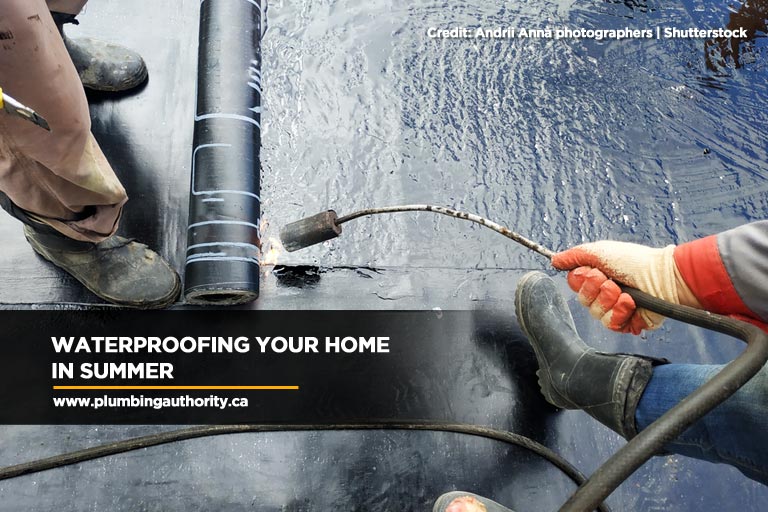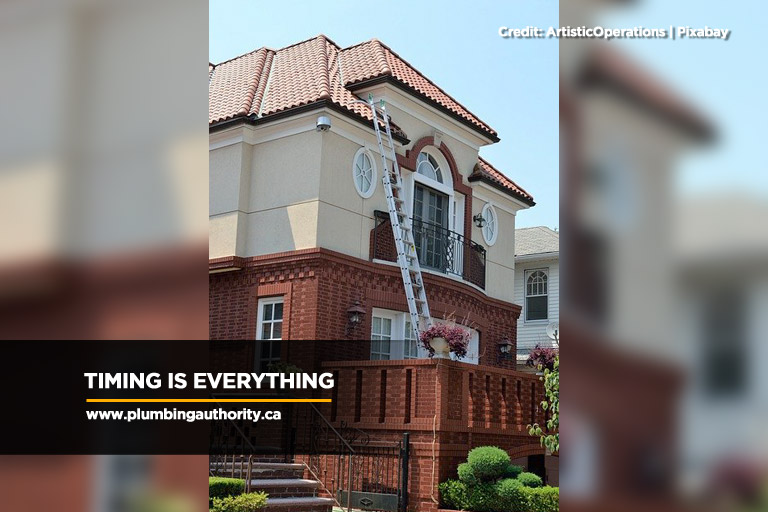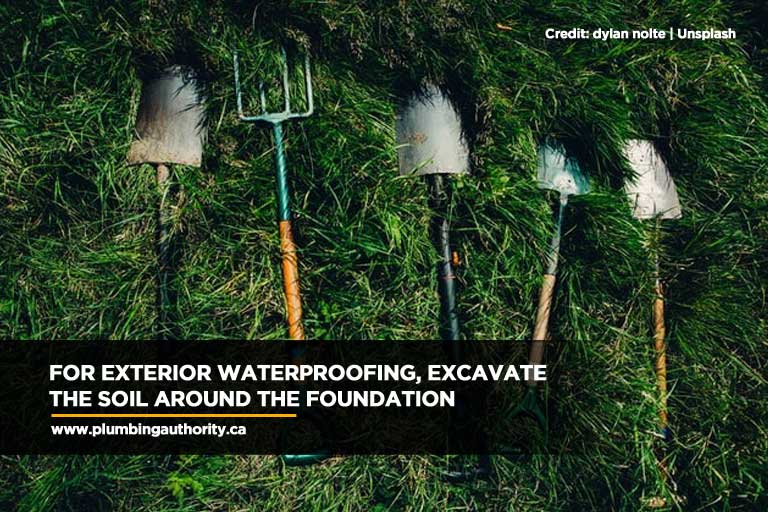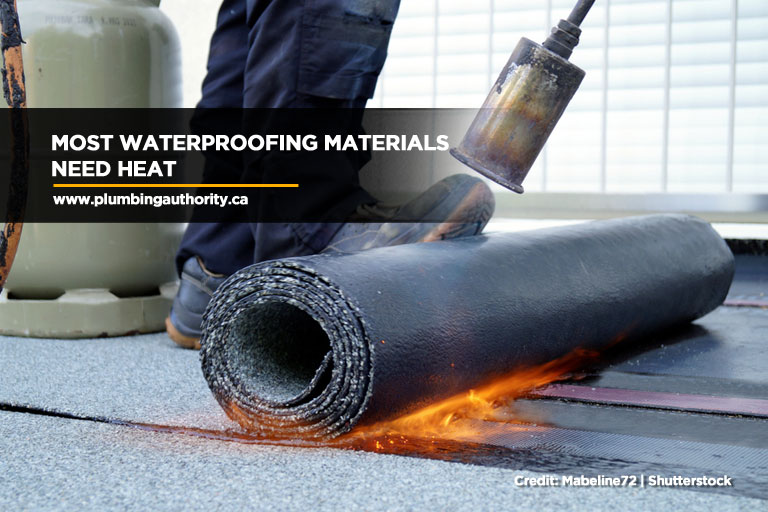
Summer is the time to enjoy the outdoors, go to the beach, or go on a vacation. However, your basement needs attention as well. After facing the cold conditions of winter and the melting snow in spring, you can finally get some work done — like waterproofing your basement.
Summer — Why It’s the Perfect Time for Waterproofing

The extreme heat of the season may be vexing. However, it also presents certain advantages — one of which is that it makes it easier to waterproof your home. Here’s why:
- The basement, foundation, and walls lose residual moisture from spring. This makes it easier to apply waterproofing materials.
- The ground around the foundation is dry and loose. It’s easier to dig around the area.
- Signs of damage, like liquid stains, mildew, or moulds, are more visible and the odour they emit is more noticeable.
- The heat reduces the time it takes for the waterproofing materials to dry.
How to Conduct a Home Inspection
Start your waterproofing efforts by thoroughly inspecting your home:
- Examine your roof for damage. Holes, no matter how small, are a good avenue for water to seep in. After sealing the holes, you can apply waterproofing paint on your roof to give it a fresh look.
- Inspect your downspouts and free them from obstruction. It should face away from the house.
- Check the foundation. Start from the exterior, then work your way inside. Look for cracks, stains, mildew, and mould.
- Examine the grading of your lawn and make sure that it slopes away from the foundation.
- Inspect the rest of your lawn and paved surfaces for areas that could hold water like puddles and fix them. The water from your house will just flow away to the gutter.
- Check the condition of the gutters and clear them from obstructions as well.
- Proceed to the basement and check the floor and walls for signs of water leaks like stains, mildew, or mould. Be attentive as well for any strange odour.
- Check the condition of your sump pump by testing it.
Top 3 Methods When Waterproofing

You can pick what method applies to your situation depending on the result of the checklist inspection.
- Drainage System
Functional drainage can effectively direct water away from your house or its foundation. The cause of moisture in the basement is usually because of a drainage problem. Inspect also the sloping level of your lawn and look for areas where puddles usually appear. Check the quality of the soil in your lawn for its level of moisture absorption or retention. If it cannot absorb much water, pave it so the water can flow freely away from the foundation and your lawn. You can use concrete waterproofing spray for your pavements. Let a professional assess your drainage system if it is adequate or needs improvement. - Exterior Waterproofing
This area usually requires a contractor or professional since this is labour intensive. To properly apply the water-sealant to the walls, the soil around the foundation should be excavated. Apply the sealant during construction. You only need to do this once, since the sealant is durable and long-lasting. Have a professional check the exterior wall located below the ground from time to time to be sure that it is free of damage. You may also apply waterproofing paint on the foundation walls above the ground. - Interior Waterproofing
This is the easiest and most affordable among the 3 methods. Since you have already identified the areas of concern in your checklist, the next thing to do is just apply a special sealant to stop water from leaking and moisture from accumulating. This allows you to make the basement as watertight as possible. These sealants can prevent condensation by controlling humidity levels. You can also prevent the growth of fungi and mould on walls by using certain waterproofing paints for concrete.
Common Types of Waterproofing Materials

Here are 5 of the common waterproofing materials available:
- Bituminous Membrane
Bitumen is asphalt, which is a sticky substance. This material is suitable for commercial and residential buildings. It can also be used for many applications like roofing construction. The membrane is laid on the surface to be waterproofed and heat is applied slowly and uniformly using a torch. While laying the membrane, avoid wrinkles while strictly maintaining proper alignment. - Cementitious Coating
The cementitious coating can highly adhere to steel and concrete. This waterproofing cement is ideal for industrial settings because it protects from acidic gases and other chemicals. Aside from internal and external waterproofing suitability, the coating is also useful for roofs and decks. It is also used to protect structures exposed to chlorides. - EPDM Rubber
EPDM (ethylene propylene diene monomer) rubber has weather and UV (ultraviolet) resistant properties, which makes it an ideal waterproofing solution for roofs and decks. Unlike other membranes where a torch is used, this membrane only needs adhesives. You just apply the adhesive to the area and the sheet while avoiding wrinkles in the installation process. - Polyurethane
This is considered the best waterproofing option for many because it can easily be applied. It can also be used as a filler for cracks. As a coating, it minimizes the water absorption property of concrete and can even harden it. Extra caution is strictly observed during the application as direct skin contact and inhalation of its fumes can harm you. Professionals are the only ones that should handle this particular waterproofing process. - PVC Membrane
PVC (polyvinylchloride) membrane is primarily used for roof waterproofing but is also commonly used for tunnels, underground structures, and pools. The PVC membrane comes in 2 types—reinforced and unreinforced. Being reinforced, this type is more durable due to its stability while unreinforced offers the flexibility of application. While it’s easy to install, one downside is that the material allows moisture to escape.
Benefits of Hiring a Waterproofing Professional

Working with a trained and knowledgeable expert will allow you to leverage various factors including their:
- Knowledge and Experience
A person with training, certification, and work experience trumps a person who relies on the trial-and-error method. Certified professionals know the science behind waterproofing and can easily apply that knowhow when working on the job. Knowing the science behind materials can give you the advantage of easily identifying the right material and technique for the situation. In addition, their experience allows them to identify best practices and avoid mistakes while anticipating and prepare for problems. - Stress-Free
Proper application of waterproofing materials requires strict adherence to surface preparation and no small amount of skill. A professional knows exactly what to do to prevent future problems and emergencies. They are proud of their job and usually offer a warranty or guarantee the quality of their work. There’s no need to get your hands dirty!
While the initial expenses may seem steep, their work is long-lasting, making it more cost-effective and worth every penny. The best plumbers offer insurance as well so you have something to fall back on should the worst-case scenario happen. - Up-to-Date With Latest Techniques and Trends
What could be the most common waterproofing method today may be obsolete the next. Professionals always remain abreast of the latest technologies and trends in their industry. They also invest in gadgets and industrial-grade equipment (like moisture meters, grinders, infrared cameras, and high-pressure hoses) to make their job easier. Investing in professionals being regularly updated on waterproofing can give you that edge.

By hiring the right company for the job, you don’t have to lift a finger. Enjoy the summer, get some much-needed R&R, and leave the dirty work to the professionals! For your waterproofing needs and concerns in Ontario, look no further than Plumbing Authority Inc. We offer free on-site estimates and the posted testimonials of satisfied customers can assure you of the quality of our services. Dial us now at (647) 992-7473 or email us at plumbingauthoritygta@gmail.com. We are ready to address your concerns 24/7.




